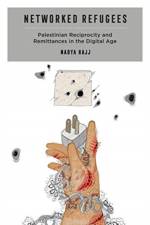- Palestinian Reciprocity and Remittances in the Digital Age
av Nadya Hajj
421
"According to the United Nations High Commissioner for Refugees, more than 1 percent of the world's people have been forced to flee from their homes. In this remarkable book, Nadya Hajj deploys her considerable theoretical and empirical gifts to explore how refugees maintain identity and community in the face of obstacles that most of us would find insurmountable. This book is essential reading for anyone interested in understanding--and ameliorating--a refugee experience that is becoming distressingly common around the world."--Tarek Masoud, coauthor of The Arab Spring: Pathways of Repression and Reform "With nuance, sensitivity, and fascinating connections across diverse social settings, Hajj offers an insightful blueprint for how transnational networks can motivate reciprocity to solve communal problems. Deeply moving stories and voices bring to life the adaptive resilience of Palestinian refugees and inspire us to recognize our power to be reciprocal activists, too."--Wendy Pearlman, author of We Crossed a Bridge and It Trembled: Voices from Syria and Violence, Nonviolence, and the Palestinian National Movement "Palestinian refugee communities have suffered the ravages of war, occupation, forced displacement, dispersion, and marginalization. This book offers keen and original insight into how they have used digital means to sustain family and community ties, facilitate the transfer of economic remittances, and maintain social interaction and reciprocity across the diaspora."--Rex J. Brynen, Department of Political Science, McGill University "In a field as substantive as Middle East studies, it is not easy to make a contribution that promises to stand out. This is such a book. Through her stunning ethnographic and survey research, Hajj has opened a window into a world seldom seen, providing enormous insights into the way Palestinian refugees in Lebanon and the diaspora--through their use of digital technology--not only resist the destruction of their community but have found new ways of rebuilding it, ensuring its cohesion and resilience, and, in the process, opening their community to new ideas and forms of organization. Although these changes are not without costs--real and potential--they challenge us to think differently about Palestinian refugees and their unimagined (or reimagined) futures. This book not only meets that challenge but exceeds it."--Sara Roy, Harvard University "Nadya Hajj's analysis of the materiality of refugee suffering is heartbreaking; and yet, Networked Refugees strikes a profoundly hopeful message."--The Critical Refugee Studies Collective "Beautifully written, and offers an analysis that is at once intellectually novel and deeply compassionate."--Ora Szekely, Associate Professor of Political Science at Clark University


